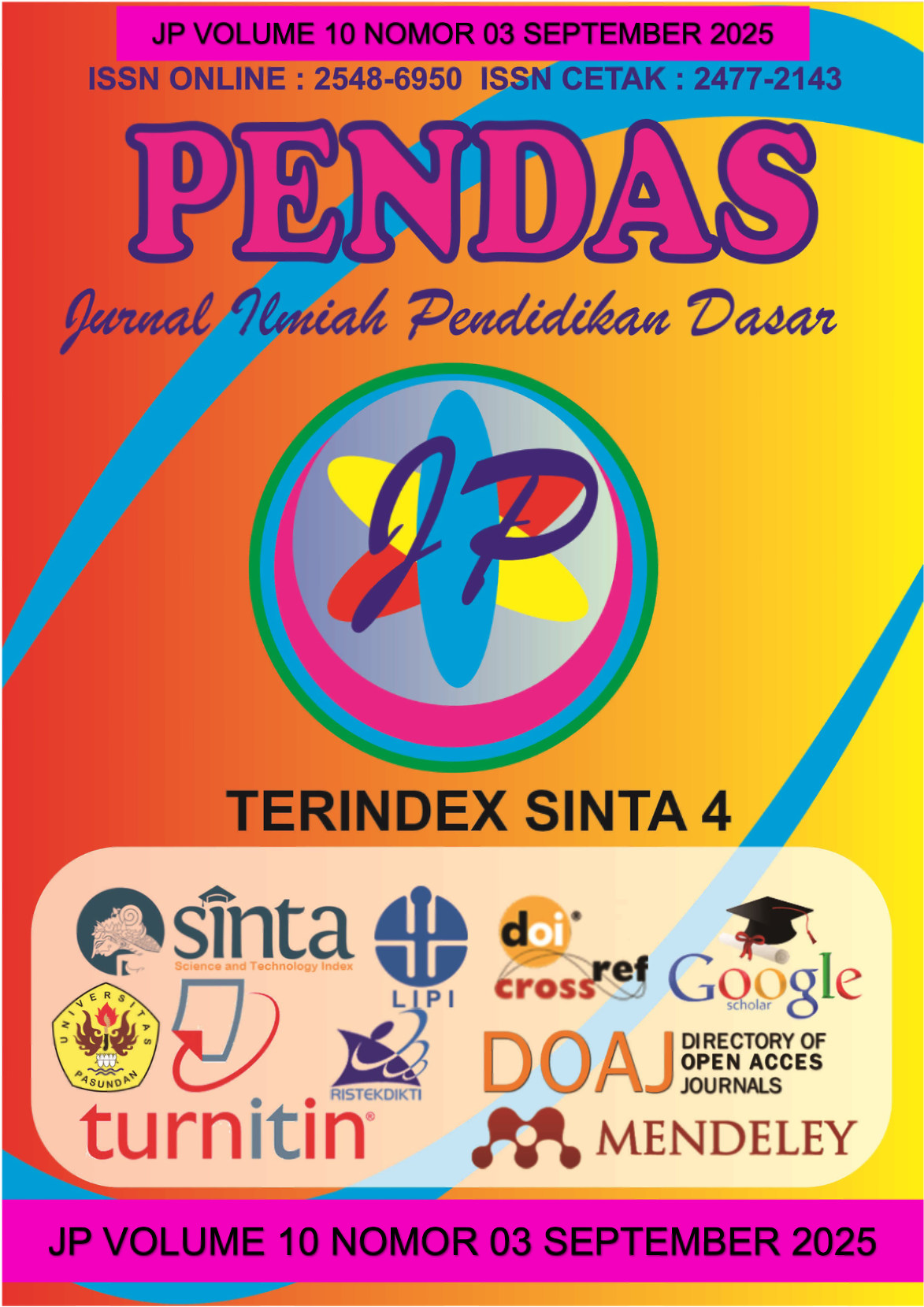PENGARUH PENDEKATAN MATEMATIKA REALISTIK TERHADAP KEMAMPUAN PEMECAHAN MASALAH MATEMATIS SISWA SMP DAYA CIPTA MEDAN
DOI:
https://doi.org/10.23969/jp.v10i03.33661Keywords:
Realistic Mathematics Approach, Mathematical Problem-Solving Skills, Learning Mastery.Abstract
This study aims to determine the effect of the Realistic Mathematics Approach (RMA) on students' mathematical problem-solving abilities and to compare the learning completeness of students taught with RMA and conventional learning. The type of research used is a quasi-experiment with a post-test only control group design. The research sample consisted of students in class VIII-1 as the experimental class who were taught using the RMA, and students in class VIII-2 as the control class who were taught using conventional methods. The research instruments were pre-test and post-test questions in the form of essays compiled based on indicators of mathematical problem-solving abilities. Data collection techniques were carried out through tests. Before testing the hypothesis, the data was tested for normality using Shapiro-Wilk and homogeneity using Levene's test. The test results showed that the data of both groups was normally distributed and homogeneous. Data analysis used the Independent Sample T-test. The t-test results showed that the t-count value was greater than the t-table (6.822 > 2.024), so the null hypothesis (H₀) was rejected and the alternative hypothesis (Hₐ) was accepted. Thus, it can be concluded that there is a significant effect of the use of the Realistic Mathematics Approach on students' mathematical problem-solving abilities. Students who learn with RMA have better problem-solving abilities than students who are taught through conventional learning at SMP Daya Cipta Medan. In addition, the mastery of problem-solving skills among students in the experimental class was higher than that of the control class, indicating that the realistic mathematics approach is more effective in improving the quality of mathematics learning.
Downloads
References
Afsari, S., Safitri, I., Harahap, S. K., & Munthe, L. S. (2021). Systematic Literature Review: Efektivitas Pendekatan Pendidikan Matematika Realistik Pada Pembelajaran Matematika. Indonesian Journal of Intellectual Publication, 1(3), 189–197. https://doi.org/10.51577/ijipublication.v1i3.117
Amin, N. F., Garancang, S., & Abunawas, K. (2023). Konsep umum populasi dan sampel dalam penelitian. Jurnal Pilar, 14(1), 15-31.
Astria, R., Haji, S., & Sumardi, H. (2024). Pengaruh Model Pembelajaran Project Based Learning Terhadap Kemampuan Pemecahan Masalah Siswa Di SMA Negeri 6 Kepahiang. Jurnal Pendidikan Matematika Indonesia, 9(1), 56–68.
Fitriana, H. (2010). Pengaruh pendekatan pendidikan matematika realistik terhadap kemampuan pemecahan masalah matematika siswa.
Sumarmo, U., Hendriana, H., & Rohaeti, E. E. (2017). Hard skills dan soft skills matematik siswa. Bandung: PT. Refika Aditama.
Hidayat, R., Siregar, E. Y., & Elindra, R. (2022). Analisis Faktor-Faktor Rendahnya Kemampuan Pemecahan Masalah Matematis Siswa di SMK Swasta Teruna Padangsidimpuan. JURNAL MathEdu (Mathematic Education Journal), 5(3), 114-120.
Jenanda, B. (2021). Pengembangan E-LKPD berbasis Pendekatan Pendidikan Matematika Realistik Indonesia (PMRI) materi Kekongruenan dan Kesebangunan Kelas IX. 2 SMP N 1 KEC. Situjuah Limo Nagari.
Khairani, M., Sumardi, H., & Muchlis, E. E. (2025). PENGARUH PENERAPAN PENDEKATAN RME TERHADAP KEMAMPUAN PEMECAHAN MASALAH MATEMATIS SISWA KELAS VIII SMP. JP2M (Jurnal Pendidikan dan Pembelajaran Matematika), 11(1), 217-226.
Kudsiyah, S. M. (2017). "Faktor-Faktor yang Mempengaruhi Kemampuan Pemecahan Masalah." Jurnal Pendidikan.
Maharani, R. (2018). "Pengaruh Model Pembelajaran Kooperatif Tipe Think-Pair-Share terhadap Hasil Belajar Matematika Siswa." Jurnal Pendidikan Matematika, 6(2), 123-130
Nurlaili, N., Fitri, D. Y., & Yusri, R. (2023). Pengaruh Pendekatan Pembelajaran Matematika Realistik (Pmr) Terhadap Kemampuan Pemecahan Masalah Matematis Siswa Kelas Viii Smpn 1 Dua Koto Kabupaten Pasaman. INSPIRAMATIKA, 9(1), 20-30.
Permendiknas No. 22 Tahun 2006 tentang Standar Isi untuk Satuan Pendidikan Dasar dan Menengah
Rohman, R. (2021). Jurnal Penelitian Pendidikan Matematika, 5(2), 165.
Sugiyono, S. (2016), Metode Penelitian Kuantitatif. Kualitatif dan R&D, Bandung: alfabeta
Sugiyono, S. (2017). Metode Penelitian Kuantitatif, Kualitatif, dan R&D. Bandung : Alfabeta, CV.
Sugiyono, S. (2019). Metode Penelitian Kuantitatif. Alfabeta.
Sumartini, T. S. (2016). Peningkatan Kemampuan Pemecahan Masalah Matematis Siswa melalui Pembelajaran Berbasis Masalah. Jurnal Mosharafa,5(2), 148–158
Sumartini, T.S. 2016. Peningkatan Kemampuan Pemecahan Masalah Matemati Siswa melalui Pembelajaran Berbasis Masalah. Jurnal Pendidikan Matematika STKIP Garut. Vol. 8, No. 3
Suryani, M., Jufri, L. H., & Putri, T. A. (2020). Analisis kemampuan pemecahan masalah siswa berdasarkan kemampuan awal matematika. Mosharafa: Jurnal Pendidikan Matematika, 9(1), 119-130.
Winarti. (2017). Kemampuan Pemecahan Masalah Siswa Dalam Menyelesaikan Soal Cerita Berdasarkan Gaya Belajar Pada Materi Pecahan di SMP. Jurnal Pendidikan dan Pembelajaran, 1-10.
Downloads
Published
Issue
Section
License
Copyright (c) 2025 Pendas : Jurnal Ilmiah Pendidikan Dasar

This work is licensed under a Creative Commons Attribution 4.0 International License.














































